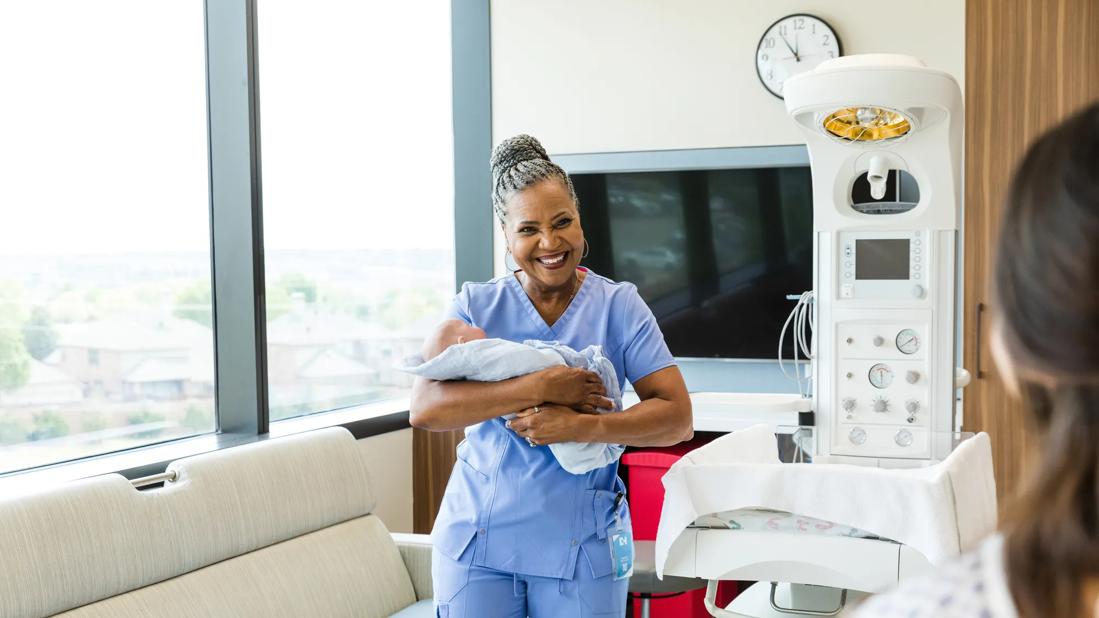Initiative helps prevent newborn falls/drops

On the mother/baby unit at Cleveland Clinic Fairview Hospital, a patient care nursing assistant (PCNA) recently saw a father walking the halls holding his newborn. While the man’s intentions were good – he wanted his tired wife to get some rest – his actions put the infant at risk for being dropped. The PCNA gently informed the dad that he needed to stay seated or push the baby in the crib.
Advertisement
Cleveland Clinic is a non-profit academic medical center. Advertising on our site helps support our mission. We do not endorse non-Cleveland Clinic products or services. Policy
The PCNA was empowered to speak up as part of Cleveland Clinic’s What a Catch program, which was implemented in March 2019 to help promote newborn safety. Instead of just reporting drops/falls, caregivers also self-report any near-misses – or “good catches” – on clipboards kept in secure locations on mother/baby units at Cleveland Clinic Fairview and Hillcrest hospitals.
“We realize this will only be a portion of the catches, but getting a frequency may be helpful in understanding the actual rate of newborn fall/drop events,” says Nora Knipper, MSN, RN, NEA-BC, Director of Nursing, Women’s and Children’s Service at Fairview Hospital. “Unfortunately, falls happen. But we are very proactive and transparent.”
Inspiration for the What a Catch program came to Knipper and Heather DiCioccio, DNP, RNC-MNN, C-ONQS, Nursing Professional Development Specialist on the mother/baby unit at Hillcrest Hospital, while partnering on an article on infant falls.
“The clinical nurse whose patient accidently dropped her baby felt moral distress. She felt responsible even though she had done all her safety checks,” says Knipper. “It was a lightbulb moment for us. What if we celebrated all of the times our caregivers prevent a baby from being dropped? The program took off from there.”
The What a Catch program has five components:
A respite nursery – “Many hospitals around the country that have gone baby-friendly have closed down their nurseries,” says DiCioccio. “But we recognize that moms are often exhausted, and they need a break sometimes.” The respite nursery is available for whoever needs it, allowing moms to take short naps with newborns safely in nursery cribs.
Advertisement
Visual management of patients – Nurses coordinate safety plans with patients, then conduct and document hourly rounds. “We keep our eyes on the patient and prop open the door so we can quietly come in and out and make sure everybody is safe,” says DiCioccio.
Situational communication and actions – Nurses promote safe alternatives and communicate them in a positive manner to parents and family members. The most common risk they catch is unsafe sleep practices, with parents dozing on beds or chairs with babies in their arms. Caregivers remind them to put infants in their cribs.
Safe and appropriate staffing – The mother/baby units use staffing guidelines set forth by the Association of Women’s Health, Obstetric and Neonatal Nurses (AWHONN). They also use couplet care, an evidence-based model where nurses care for both the postpartum mother and her newborn as a couplet rather than some nurses caring for moms and other nurses caring for babies.
Celebrations – Caregivers communicate good catches to leaders, who send caregiver celebrations for all staff to see. The units also display a board with “good catches” to show how many times a potential newborn drop/fall was prevented. “It’s a talking point for patients when they are up and ambulating,” says Knipper. “Nobody thinks they will ever drop their baby.”
The success of the program hinges on collaboration. Any staff member on the unit who sees an unsafe situation is encouraged to speak up, including nurses, PCNAs, providers, dietary and environmental services’ employees. Non-clinical caregivers inform nurses, who intervene.
Advertisement
“We had an anesthesiologist provider on the unit in the middle of the night who was aware of the What a Catch program,” says Knipper. “He went into a room, identified an unsafe sleep practice, corrected it and told the charge nurse.”
Fairview and Hillcrest hospitals have tallied 466 good catches between the second quarter of 2019 and the third quarter of 2021. The combined number of newborn falls/drops decreased from seven in 2018 to five in 2019 and only one in 2020.
“We are all in this,” says Knipper. “We all have to keep our eyes open and keep these babies safe.”
What a Catch is gaining nationwide attention. Knipper and DiCioccio presented the program at the 2021 AWHONN Convention and the ANCC National Magnet Conference®. They also published an article about it in the May/June 2021 issue of MCN: The American Journal of Maternal/Child Nursing. In addition, the program was recognized as a best practice during a September 2021 Joint Commission survey at Fairview Hospital.
Advertisement
Advertisement

Planning continues with critical, patient-focused input from nursing teams

Strengthening care through targeted resources and frontline voices

Embracing generational differences to create strong nursing teams

CRNA careers offer challenge and reward

An unexpected health scare provides a potent reminder of what patients need most from their caregivers

Cleveland Clinic Abu Dhabi initiative reduces ICU admissions and strengthens caregiver collaboration

Veteran nurse blends compassion, cutting-edge transplant training and military tradition to elevate patient care

Embrace coaching and other tips to be a stronger leader